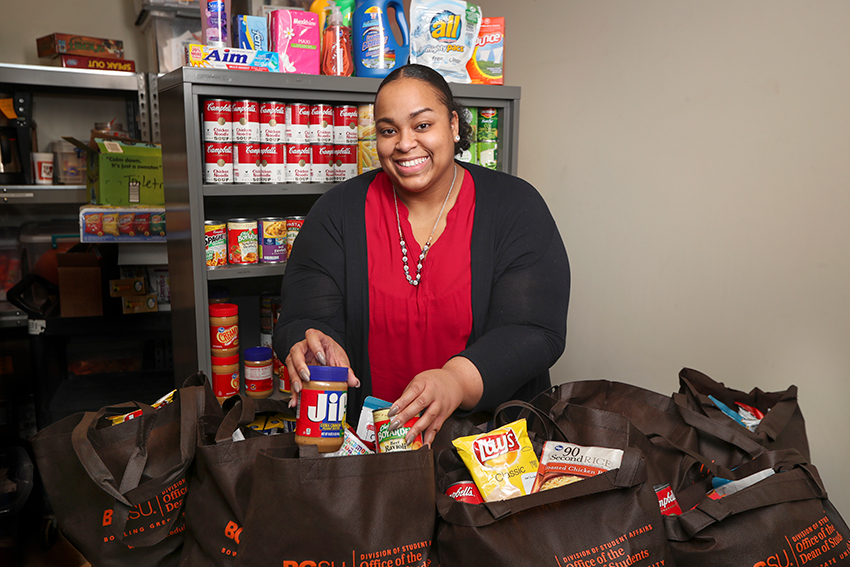Grab and Go, Falcon Care nurture student success

By Sam Sharp
“I have a 4-year-old and I would hate for her to be in college one day and need food, only to talk to someone whose hands are tied because of budgetary or resource issues,” said Danielle Haynes, coordinator of student case management in the Office of the Dean of Students.
Haynes spent last summer trying to come up with different ways to accommodate food- insecure students who were struggling to utilize existing resources. She started the University’s Grab and Go program as a summer pilot project and, thanks to her tremendous effort, it has blossomed into a full-time program in the Office of the Dean of Students.
In her daily work, Haynes started noticing that some students were facing food insecurity and she felt inspired to help them find resources. She designed the Grab and Go program to help students receive specific resources that are tailored to their individual needs. The donations are packaged in tote bags provided by the dean of students office, which allows students access to portable donations that they can take off-campus. The Grab and Go bags include: cereal, oatmeal, rice, tuna, canned vegetables, canned fruit, instant macaroni and cheese, chips, peanut butter, ravioli and a small bag filled with toiletry items.
According to Haynes, each bag contains “enough food for three meals a day for three days.” Students with dietary restrictions are given the option to receive alternative items, which reduces food waste.
“We really saw that the need was there,” Haynes said. “A lot of times, people have a misimpression that college students are living their best lives and everyone gets their refund check, and they’re not struggling because they have parents — and that’s very false.”
Food insecurity is difficult to detect but affects 1 in 7 Americans. In regard to that statistic, Dr. Thomas Gibson, vice president for student affairs and vice provost, said, “This is one of those invisible problems that many colleges don’t seem aware of, and at BGSU we don’t want to be one of those institutions with their head in the sand.
“We know that food insecurity is related to poor academic performance and it negatively impacts student success, which could include low grade point averages,” Gibson said. “It could impact retention, as well as completion rates, so this is why this initiative is important.”
In addition to Grab and Go, students in need of assistance have other options to choose from, including the Food for Thought mobile pantry and the Falcon Care Program, to which students may donate swipes from their meal plans. It also receives support from Dining Services.
Students’ participation in both Grab and Go and Falcon Care also serves to notify the Office of the Dean of Students of any personal life issues they are struggling with. After filling out an application, they are involved with student case management staff, “who can help identify their personal needs and offer additional resources that will set them back on the right track,” said Michael Paulus, BGSU Dining Services director.
Falcon Care began in 2014 and continues to provide aid for students. After filling out an application, eligible students are issued a generic Falcon Care card loaded with five dining hall meal swipes.
“They look generic and everyone uses them on campus, so it eliminates the stigma of embarrassment,” Paulus said.
Dining Services donates the first round of cards each semester until there are enough donations to cover the need-based costs.
Students can donate one swipe per week at The Oaks or Carillon Place. They can talk to a dining hall cashier and ask to donate from an existing meal plan or pay the cash equivalent of one swipe. The University’s philanthropy event “Giving Tuesday” raised 115 meal swipes for Falcon Care and $850 for the Grab and Go program.
“It’s students helping students, which helps us and gives our students the opportunity to grow as better people,” Paulus said.
These food insecurity programs allow students to give back to their peers and help the University’s retention rates in the long run, Gibson said.
If members of the University community suspect that food insecurity is happening to an individual, even if not immediately life-threatening, they can make an incident report on the dean of students’ website under the See It. Hear It. Report it. initiative section.
“We want to make sure that our students have every chance for success here at BGSU, and if addressing food insecurity is just one piece of the puzzle to supporting that, we want to make sure we have this resource in place to support them,” Gibson said.
Updated: 10/10/2025 08:47AM
